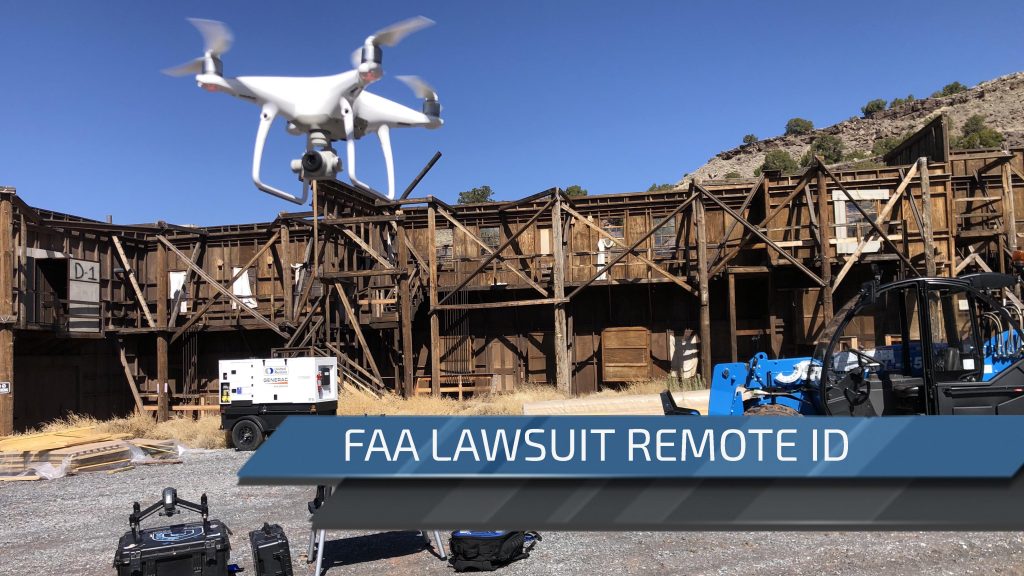
Race Day Quads is taking the FAA to court over Remote ID, arguing constitutional violations in the new Lawsuit.
The FAA’s digital license plate system, Remote ID is now heading to court thanks to a lawsuit brought upon by Race Day Quads. This complex lawsuit is alleging various failures on behalf of the FAA. Drone pilots will remember the battle when Remote ID was announced early last year. Numerous comments on the NPRM of Remote ID alleged that Remote ID’s intended purpose was built around surveillance and enforcement of FAA regulations. Remote ID regulations currently state that drone pilots will have to broadcast certain data that would be available to the public and law enforcement.
Race Day Quad’s lawsuit against Remote ID may actually propel the industry forward and speed up growth. Many manufacturers have stated that without having a Remote ID broadcast protocol it is difficult to innovate and build for the future. Race Day Quads lawsuit against the FAA applies multiple and lengthy arguments, including:
- Tracking and collection of GPS data Violates the 4th Amendment.
- FAA didn’t follow regulatory protocols when developing Remote ID.
- FAA extended their authority of Navigable Airspace to include all uas pilots, even kids in the backyard below the tree line.
- FAA withheld information on secret meetings with private industry stakeholders and government agencies during rule-making.
- 5th Amendment Violation with creation of FRIA’s & private entities controlling public access.
Listen to the entire Ask Drone U Interview with Race Day Quads and Jonathan Rupprecht.
Reading this lawsuit may take a law degree from an online university. The lawsuit against the FAA has numerous and meticulous constitutional arguments. For example, Remote ID requires entities to record and collect GPS information of the drone and the pilot. Another author made the point that, “this would be analogous to a cell phones full location history being tracked and stored and available to all law enforcement, even if a person isn’t being monitored. This, of course, requires a warrant.” The lawsuit also notes that it is unclear how long this data would be stored as well.
The lawsuit cited Carpenter v. United States, which upheld that warrantless search and seizure of cell phone records was a 4th amendment violation. The majority opinion in the case mentioned that “Fourth Amendment protects not only property interests, but also reasonable expectations of privacy.” The lawsuit states that Remote ID is already more intrusive than technology already recognized as unconstitutional. The lawsuit goes even further stating that the data would be stored for an undetermined amount of time.
Race Day Quad’s also alleges that the FAA partook in secret meetings with the FBI and private stake holders during the rule making period. With multiple FOIA requests, Representing Attorney Jonathan Rupprecht figured out that the FAA was meeting with private stakeholders. While this may not seem nefarious, 49 CFR §5.19 states that
“(2) After the issuance of the NPRM and pending completion of the final rule, DOT personnel should avoid giving persons outside the Executive Branch information regarding the rulemaking that is not available generally to the public.”
Jonathan Rupprecht stated on his blog that he has “no idea how the FAA complied with the regulations above during all of the stuff below….such as during the secret FBI academy remote ID demo where the FAA booklet literally says, “Brief summary of demonstration and Q&A” Drone Responders, Pierce Aerospace, NFL security and a bunch of state and local law enforcement went to this special meeting. Why did Drone Responders get to go to this secret meeting but not AMA, AUVSI, or anyone else?”
On the podcast, Mr. Rupprecht mentioned that all drone pilots thought they were commenting on the Remote ID regulations, meanwhile further delegation was going on. The public wasn’t given access to the entire story.
While the outcome of this lawsuit may lead to a repeat of the Drone registration saga, the overall authority of the FAA is now in question.
The FAA must now clarify and define what is navigable airspace and how it applies to drone pilots. Does it really apply to kids flying in their back yards, below the tree line? The Causby v. United States case has stated that property owners do have “useable” rights of their airspace. While home owners do have legal use of their airspace, the airspace is also a public domain. Which is why Southwest Airlines doesn’t call you or the nearby reservation for permission, when they fly over the land.
Many FPV pilots have argued that the FAA is overstepping their legally mandated authority with navigable airspace. Many experienced pilots and CFI’s have stated if a helicopter is flying below the tree line, they have much greater problems than a drone flying in the same airspace.
The lawsuit over Remote ID includes numerous other arguments. Including that drone pilots who couldn’t comply with the broadcast standard would be forced to fly in FRIA’s. These areas would be controlled by private institutions controlling public access, which is argued to be a 5th amendment violation.
The lawsuit is being tried in Federal Court and should provide some answers to the industry by late 2021 into Early 2022. To read more in-depth findings on the Remote ID lawsuit against the FAA, we recommend you check out Jonathan Rupprecht’s lengthy blog posts.
Only time will tell what comes of the Lawsuit. It’s easy to assume the industry would benefit from clarity on numerous topics presented by Rupprecht and his legal team.
You can support the legal challenge of Race Day Quads, by visiting their Go Fund Me page.







Add Your Comment